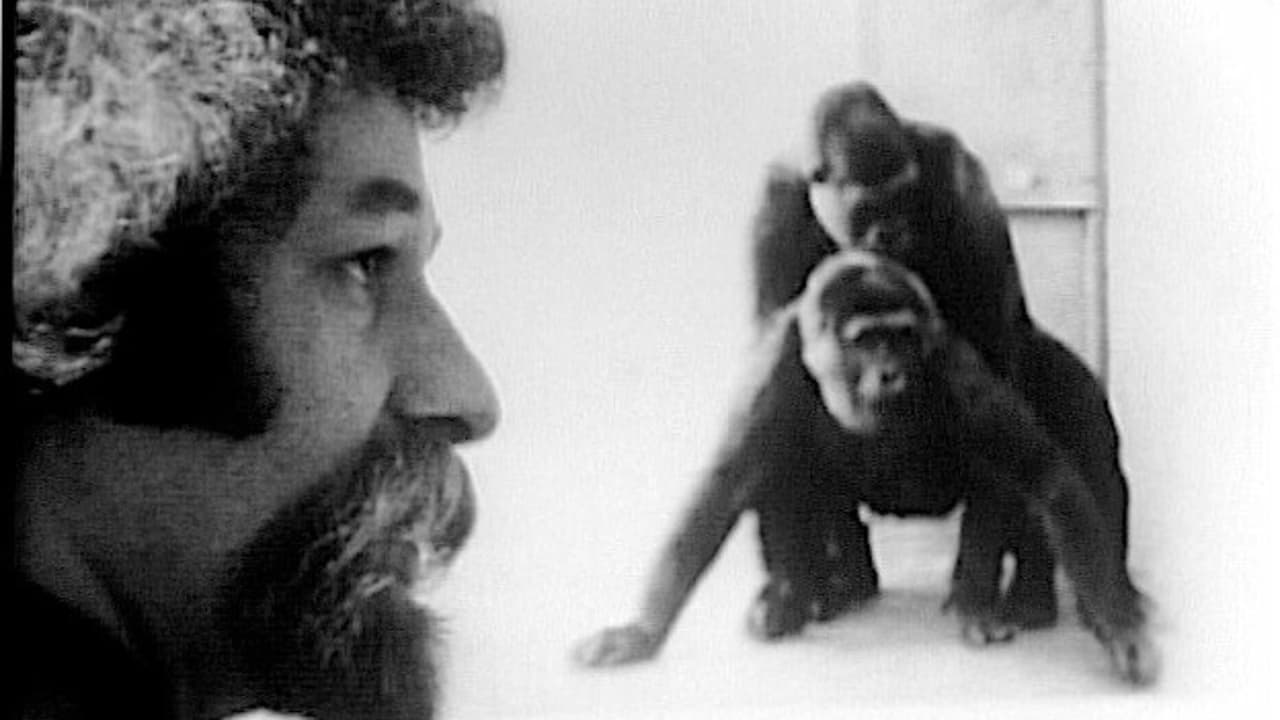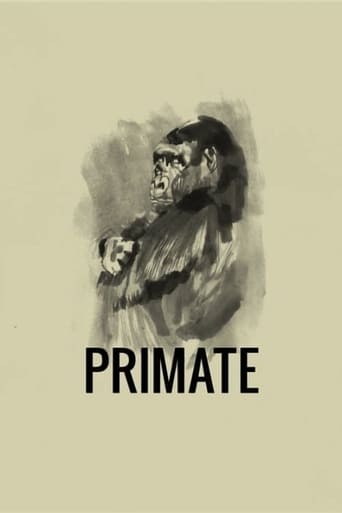tieman64
"The assumption that animals are without rights, and the illusion that our treatment of them has no moral significance, is a positively outrageous example of Western crudity and barbarity. Universal compassion is the only guarantee of morality." ― Arthur SchopenhauerAnother disturbing but fascinating documentary from Frederick Wiseman, "Primate" observes scientists at work at the Yerkes Regional Primate Research Center. His title alluding to both men and apes, Wiseman's film opens with a series of close-ups in which the paintings and statues of esteemed human scientists segue into shots of apes in cages. The film's hierarchy is being set up here – man as enlightened and lording over nature – but also its mocking tone, Wisemen's apes and men inseparable, base and equally absurd.Wiseman's more grotesque films ("Hospital", "Titicut Follies", "Blind", "Welfare", "Meat" etc) tend to feature humans and animals being brutalised within social institutions. "Primate" itself mostly consists of a series of increasingly violent tests being carried out on apes and gorillas. These tests include vivisections, injections, decapitations and so forth. This, of course, recalls the murdered animals in Wiseman's "Meat", the grotesque rehabilitation centres of "Blind", the surgical procedures of "Hospital" and the lobotomies and torture sessions of "Titicut Follies". The cruelty of "Primate" is not an aberration. This is how human "civilization" works. But are such things necessary?Wiseman uses simple juxtapositions throughout the film. The detachment and mundanity of the scientists, for example, is repeatedly contrasted with the gruesomeness and apparent senselessness of their experiments. Elsewhere we see female scientists maternally caring for infant apes. "Good morning, darlings. Good morning, Mama's babies," they say, reinforcing our sentimental identification with the animals. In the following scene, though, we're back to apes being subject to human domination, mutilation, and termination.Like "Blind", Wiseman questions the nature of kindness and altruism. He establishes a dialectic between acts that we are likely to perceive as kindness and acts that we are likely to perceive as cruelty. Eventually, though, the kindness of the researches reveals itself to be a form of betrayal or hypocrisy, all designed to ease the consciences of the scientists and make the apes more malleable and prone to co-operation. This, of course, recalls the handicapped men and women of Wiseman's "Blind", who are "taken care of" and "rehabilitated", but also exploited and used as cheap labour by Army contractors. Recall too the panoptical mental hospitals of "Titicut Follies", whose atmosphere of confinement and observation echoes the world of Yerkes Research Center. Indeed, the inmates at "Titicut's" mental hospital echo the apes at Yerkes in numerous ways. Both groups are powerless, subject to forced feedings, studied in a chillingly detached, unsympathetic manner, and suffer abuses rationalised as being "necessary" and "humane"."Primate's" most gruesome sequence finds a baby gibbon being anaesthetised. A hole is then drilled into its skull, a needle inserted and its chest cavity opened. The gibbon's skull is then cracked open before it is outright decapitated. It's brain is then sliced and put on microscopic slides. Later, scientists discuss whether such "animal cruelty" is justified. Yes, they decide. "All research is useful," a scientist says, "even though its usefulness is not apparent at the time it's done."Much of the film finds the scientists studying the sexual behaviour of apes. Their studies reduce sexual behaviour to droll mechanics, the scientists stimulating erections and even ejaculating the apes, sometimes by means of brain-implanted electrodes. After a while it becomes clear, though, that Wiseman has positioned us to study these human scientists in much the same way that they are studying the apes. To the scientists, animals are always "the observed", always on one clear side of the subject/object divide. The very language of the scientists seeks to objectify the animals, reducing them to pieces of meat; a means to a larger end. Wiseman's camera performs a similar trick on the scientists, reducing them to grotesque, silly, banal bundles of arrogant flesh. But while Wiseman's stance invites us to experience a kind of comic and cosmic rage, it is not simply accusatory, but deliberately paradoxical. His stance is not forensic, or even political (ie – a simple question of animal rights), but existential. "Primate" is not about a corrupt social institution but abut something that is much more invisible and complex. Most of the institutions Wiseman explores are filled with deep-rooted contradictions, with conflicting policies which are perhaps impossible to resolve."Primate" ends with a rhesus money in a Perspex contraption being blasted off into the stratosphere. The scientists, we learn, are now researching zero-gravity conditions. Final shot? A monkey mockingly sticking out its tongue at us. Wiseman cuts to black.8.5/10 – See "American Experience: The Boy In The Bubble".
meddlecore
In this film the direct cinema legend, Frederick Wiseman, visits and observes the daily activities that take place at the Yerkes Primate Research Center in Atlanta, Georgia. "Scientists in the film are concerned with studying the physical and mental development of primates. Some of the experimental work shown in the film deals with the capacity to learn, remember, and apply language and manual skills; the effect of alcohol and drugs on behavior; the control of aggressive and sexual behavior; and other neural and physiological determinants of behavior." (from www.zipporah.com) Wiseman begins by showing us the great apes- orangutans and chimpanzees- that are caged in prison like cells, often looking saddened and depressed. Most of the reviews I have read on this film focus on the goals and accomplishments that the scientists have achieved by studying these monkeys and apes. Watching this, I personally feel that Wiseman is attempting to make us question the ethics of this practice. Animal studies, especially those on primates that are genetically similar to ourselves, have become (for the most part) an accepted and ignored element of society. It is believed that the benefits of such a practice far outweigh the gains, but some of the images in this film make you question this. This is what I believe that Wiseman was trying to achieve- similar to his portrayal of the Bridgewater Mental Facility in his film "Titticut Follies". Many images in this film are disturbing...just a warning. This could be viewed as much of an animal rights documentary as could "Meat", but can also be seen as the observation of justified scientific studies on primates. I guess it depends on how you look at it, but regardless of this, Wiseman's editing is not unbiased. The mere selectivity of images and order of their juxtaposition is used to convey his message despite the observational/direct cinema nature of the film. Another winner by Wiseman.
patonamu
Theme: Experiments on monkeys at a scientific research base. And Mr. master-of-direct-cinema Wiseman presents another institution, like in his other documentaries (Highschool, Hospital ("Near Death"), Army).Only this time we have a very controversial and gruesome piece of "document". In the beginning, we see gorillas in cages and some(like me) may think already then:"How inhumane.Let them free." But actually, they live in paradise compared to the "experiments" and "operations" still awaiting the viewer/monkeys. Wiseman in his ingenuously "absent presence", i.e. his seemingly invisible camera and his unbiased editing, forces us to create a story and an opinion on our own. So there will be no ending in reviewing and rediscussing the film.

